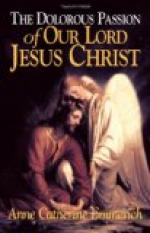The majority of the Apostles, overcome with terror, were wandering about among the valleys which surround Jerusalem, and at times took refuge in the caverns beneath Mount Olivet. They started if they came in contact with one another, spoke in trembling tones, and separated on the least noise being heard. First they concealed themselves in one cave and then in another, next they endeavoured to return to the town, while some of their number climbed to the top of Mount Olivet and cast anxious glances at the torches, the light of which they could see glimmering at and about Sion; they listened to every distant sound, made a thousand different conjectures, and then returned to the valley, in hopes of getting some certain intelligence.
The streets in the vicinity of Caiphas’s tribunal were brightly illuminated with lamps and torches, but, as the crowds gathered around it, the noise and confusion continued to increase. Mingling with these discordant sounds might be heard the bellowing of the beasts which were tethered on the outside of the walls of Jerusalem, and the plaintive bleating of the lambs. There was something most touching in the bleating of these lambs, which were to be sacrificed on the following day in the Temple,—the one Lamb alone who was about to be offered a willing sacrifice opened not his mouth, like a sheep in the hands of the butcher, which resists not, or the lamb which is silent before the shearer; and that Lamb was the Lamb of God—the Lamb without spot—the true Paschal Lamb—Jesus Christ himself.
The sky looked dark, gloomy, and threatening—the moon was red, and covered with livid spots; it appeared as if dreading to reach its full, because its Creator was then to die.




